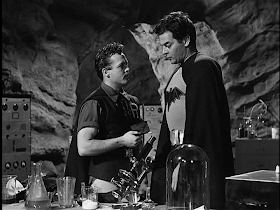Each Friday, I take one of the entries from my old Super Posts and expand it into its own featured article.
This week: The Batcave!
Originally, the closest thing Batman had to a Batcave was an old barn he used for a hangar/garage, which he accessed via underground tunnel connected to Wayne Manor. You can see it here in Detective Comics #48 (December 1940).
In Batman #12 (June 1942), we see underground hangars as an extension of the above idea, but they're presented as man-made. Incidentally, Batman #12 is the first appearance of Batman's trophy room, which is housed in Wayne Manor and mainly exists as a way for Batman and Robin to talk about past cases.
In 1943, Batman received his first serial, also called Batman. In it, Batman was a government agent and his base was a cave called The Bat's Cave, which debuted in the chapter of the same name (July 1943). It didn't house much except a desk and some science equipment. Although it was thematically appropriate, the only reason for it was as a money-saving measure since the studio already had a cave set.
It was thematically appropriate, though, so the Batcave itself first appeared in Detective Comics #83 (November 1943). Note that the image is essentially the same as the one above, only now drawn so that it exists in a natural cave. Also note that they've moved the trophy room into the Batcave.
Interestingly, Detective Comics #205 (January 1954) shows that Bruce originally planned to use the barn as his base of operations, but he fell through the floor and discovered the cave. That's a neat way to smooth that history!...although you'll also notice this says Bruce bought Wayne Manor as an adult, which is its own continuity snafu.
The Batcave, of course, has become a major part of the Batman mythos, appearing in every film and tv adaptation since, even the "grounded" Christopher Nolan films. It also, of course, continued to appear in comics after the New 52 and Rebirth.






No comments:
Post a Comment